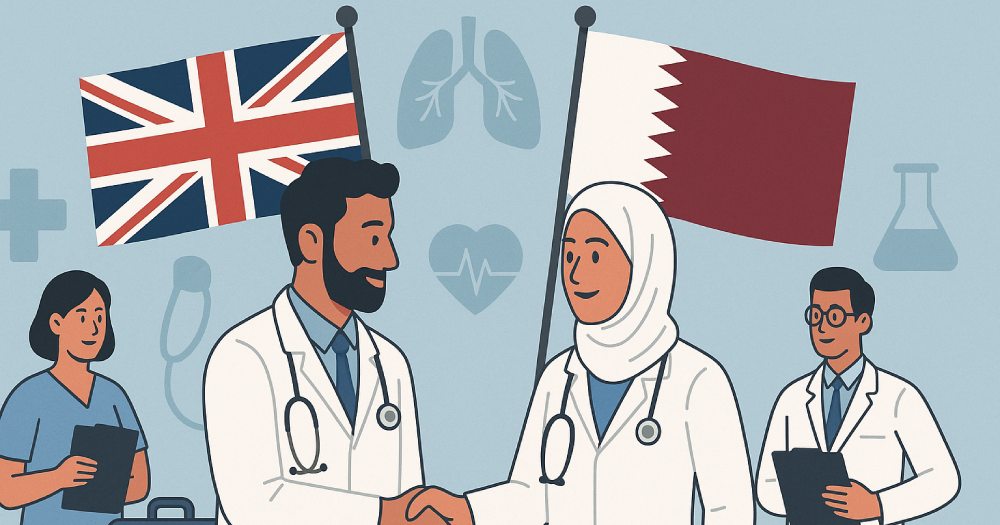Qatar, UK discuss a broad cooperation in healthcare

Qatar and the United Kingdom recently sat down — virtually — to tackle some of the thorniest challenges in global healthcare. On one end of the video call was Dr. Salih Ali Al Marri, Qatar's Assistant Minister of Public Health for Health Affairs. On the other: Fionn Craig, Deputy Director of Bilateral Relations and Trade at the UK's Department of Health and Social Care. What brought them together was a shared determination to get ahead of the curve on issues like antibiotic resistance, artificial intelligence, and digital transformation in healthcare.
The conversation was part of a broader Joint Working Group, and while no headlines were made, the topics discussed showed just how ambitious both sides are in reshaping healthcare for the better.
How does it work?
So what exactly did this duo talk about? A little bit of everything — but here are the highlights:
- Antimicrobial resistance (AMR): Both sides laid out their national strategies. Qatar shared its programme to combat AMR, including how it secures antibiotics. The UK, meanwhile, outlined its response to the 2024 UN Political Declaration on AMR, and floated the idea of an independent scientific committee to guide actions with hard evidence.
- Digital healthcare and AI: Qatar showcased its Health Information Exchange Platform and talked about integrating AI in everything from diagnostics to logistics. The UK brought in its 10-year plan to go from paper records to full digital systems, plus lessons learned on the ethics and governance of AI in medicine.
- Supply chain resilience: Qatar spoke about how it's using AI to shore up its medical supply chains, while both parties exchanged views on making healthcare delivery more robust and less vulnerable to disruption.
- Patient safety: Qatar presented its national framework, focusing on new policies and training programs for risk management. The UK shared its own practices in keeping patients safe and informed.
As we all know, healthcare isn't just about treating illness — it's about building systems that are ready for anything.
Why does it matter?
This isn't just a diplomatic chat for the record books. It's a glimpse into how countries are now viewing healthcare as a shared global responsibility. Here's why this matters:
- Antibiotic resistance is everyone's problem. Bacteria don't respect borders. If superbugs grow unchecked in one part of the world, they'll spread everywhere. A coordinated response — especially between countries with deep research capabilities and strong public health systems — is vital.
- AI in healthcare is booming. But with that boom comes big questions: How do you regulate it? How do you make sure it's ethical? Qatar and the UK are putting their heads together on this now, before the technology outruns the rules.
- Resilient supply chains mean fewer shortages. The pandemic made it painfully clear: without strong logistics, even the best healthcare systems falter. Sharing what works (and what doesn't) helps both sides stay one step ahead.
- Patient safety can't be an afterthought. Both countries are investing in national plans and training to reduce risks and improve care quality.
The context
This meeting didn't happen in a vacuum. It comes at a time when healthcare systems are under pressure — technologically, economically, and demographically. The UK is pushing through major reforms, with an eye on digitization and decentralization. Qatar, on the other hand, is investing heavily in innovation to build a world-class health infrastructure that's both tech-forward and sustainable.
And behind it all is a bigger shift: countries aren't just focusing inward. They're building partnerships to share expertise, test ideas, and leapfrog challenges.
Again, there was no fanfare and no photo ops. Just two nations getting serious about the future of health.
💡Did you know?
You can take your DHArab experience to the next level with our Premium Membership.👉 Click here to learn more
🛠️Featured tool
 Easy-Peasy
Easy-Peasy
An all-in-one AI tool offering the ability to build no-code AI Bots, create articles & social media posts, convert text into natural speech in 40+ languages, create and edit images, generate videos, and more.
👉 Click here to learn more


